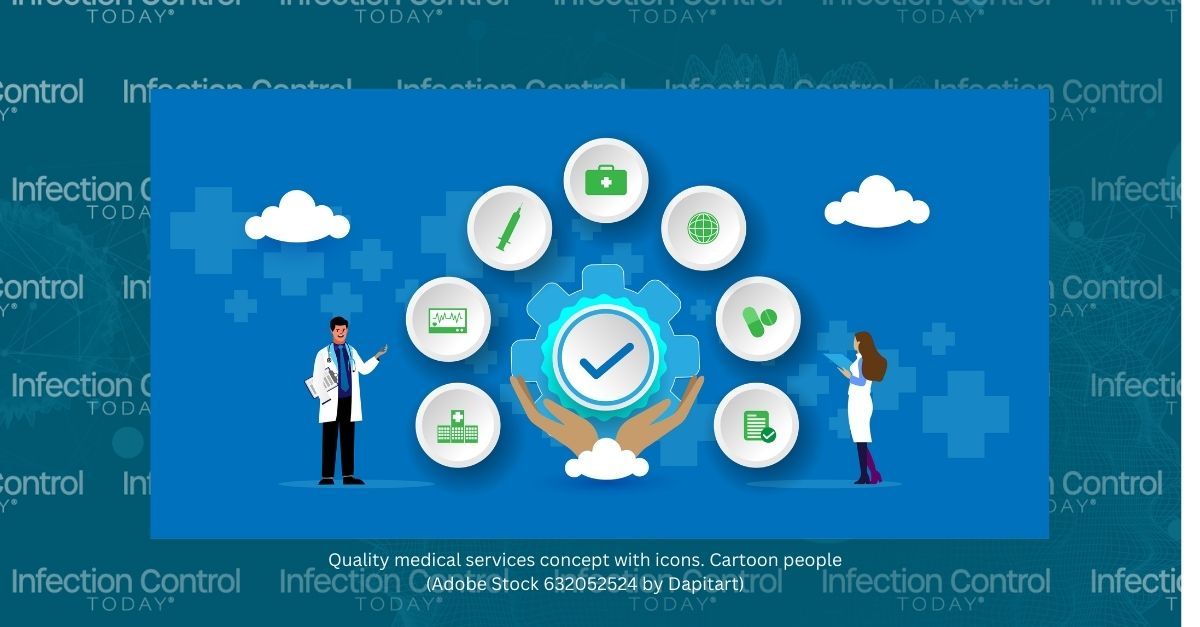The Benefits of Achieving Certifications and Training in the Field of Infection Prevention
The field of health care has placed a great emphasis on infection prevention in recent years, making it imperative for professionals in this domain to obtain certifications and additional training. These credentials verify their expertise and enable them to gain access to better job prospects and higher earning potential.
Quality medical services concept With icons. Cartoon People
(Adobe Stock 632052524 By Dapitart)

Certifications and additional training demonstrate a validation of knowledge and skills; increased marketability, earning potential, confidence, and academic performance; and competitive advantage. In findings from one study, 91% of hiring managers report that certifications are an important consideration when hiring.1 Certifications can validate mastery of specific skills, knowledge, and abilities, and recertifications can meet ongoing learning and practice requirements.
In today’s challenging health care environment, certifications and training provide numerous advantages to the organization, health care workers, and patients. Certification is a vehicle for hospitals to differentiate themselves from competitors.2 Employers benefit from certifications and additional training by contributing to an environment of professionalism and retention and enhancing applications for Magnet Recognition per the American Nurses Credentialing Center.3 Health care workers can validate their expert knowledge and skill and receive recognition, advancement, and a sense of accomplishment and achievement, and they have reported higher job satisfaction.3 Patients benefit from certifications with better clinical outcomes, decreased rates of infections, and decreased odds of mortality.4 Examples of health care certifications include Certified Patient Care Technician, Certified EKG Technician, Certified Phlebotomy Technician, Certified Pharmacy Technician, Trauma Certified Registered Nurse, Critical Care Clinical Nurse, and Certified in Infection Control (CIC).
The CIC is a nationally accredited certification for infection preventionists (IPs) that demonstrates competency in infection prevention and control and is the leading certification for IPs. The CIC tests 8 different competencies, including identification of infectious disease processes, surveillance and epidemiology, transmission of infection agents and hospital-acquired infections, employee and occupational health, management and communication, education and research, environment of care, and cleaning, disinfecting, and sterilization. There are numerous advantages to acquiring a CIC, including salary increase and enhanced participation in infection prevention collaboratives and evidence-based practices.5 Evidence has also suggested hospitals with certified IPs have lower infection rates.4 Results from one study found that IPs who are certified make an average annual salary of $85,911 compared with noncertified IPs, who make an average annual salary of $68,817.6 The certification of IPs in health care settings represents the individual’s and their institution’s dedication and commitment to infection prevention and control practices. Additionally, acquiring a CIC increases the marketability of IPs in the job market. Results from one study found that at least 46% of IP job openings in the United States required a CIC.5 State legislation in many states now requires certified IPs in hospitals and long-term care facilities, which increases the marketability of a certified IP.
The Certification Board of Infection Control and Epidemiology (CBIC) also offers other certification options, including the Associate - Infection Prevention Control (a-IPC), which targets entry-level IPs or others who want to learn about infection control but do not wish to be an IP. The a-IPC measures basic IP knowledge. Additionally, the CBIC offers the Long-Term Care Certification in Infection Prevention, which addresses infection prevention practices in the long-term care setting. The CBIC is also developing an advanced certification in infection prevention and control that will focus on the outer circle of future-oriented competencies such as research, leadership, and professional stewardship in infection prevention.
As an IP, certification and additional training offer many benefits at the professional and facility level. The diverse field of infection prevention allows many certification and training opportunities that validate their expert knowledge and skills. Many IPs benefit from additional training in leadership, performance improvement, project development, project management, research methodology, and health care administration. Other certifications besides the CIC that experienced IPs can seek include Certified Industrial Hygienist, Certified Professional in Patient Safety, or Certified Professional in Healthcare Quality.
Along with professionals in fields requiring time to study for certifications and additional training, IPs struggle with doing their day jobs and studying. Additionally, many IPs are a few years removed from their academic careers, and their study skills may need to be improved. For any certification, partnering with others studying for the same examination or completing the same training course would be recommended. IPs will also be more successful if they have support from their leadership to spend time preparing for the examinations or taking additional training to improve their skills and knowledge. Using resources for the certification examinations is important. For example, the CBIC and the Association for Professionals in Infection Control and Epidemiology (APIC) have numerous study guides, resources, and access to study groups.7-8 The APIC also offers scholarships and mentorships to encourage and support IPs in certification.
Professionals, especially health care professionals, benefit from certifications and additional training. They validate expert knowledge and skills along with recognition, advancement, and a sense of confidence. IPs can use certifications and training to advance their practice and career and have multiple options in the diverse field.
References
1. The value of certification. Certiport. Accessed December 19, 2023. https://certiport.pearsonvue.com/About/The-value-of-certification.aspx
2. Certification benefits patients, employers, and nurses. Accessed December 19, 2023. https://www.aacn.org/certification/value-of-certification-resource-center/nurse-certification-benefits-patients-employers-and-nurses
3. ANCC Magnet Recognition Program. American Nurses Credentialing Center. Accessed December 19, 2023. https://www.nursingworld.org/organizational-programs/magnet/
4. Kendall-Gallagher D, Blegen MA. Competence and certification of registered nurses and safety of patients in intensive care units. Am J Crit Care. 2009;18(2):106-113. doi:10.4037/ajcc2009487
5. Marx JF, Callery S, Boukidjian R. Value of certification in infection prevention and control. Am J Infect Control. 2019;47(10):1265-1269. doi:10.1016/j.ajic.2019.04.169
6. Knighton SC, Gilmartin HM, Reese SM. Factors affecting annual compensation and professional development support for infection preventionists: implications for recruitment and retention. Am J Infect Control. 2018;46(8):865-869. doi:10.1016/j.ajic.2018.03.009
7. Certification Board of Infection Control and Epidemiology, Inc. Accessed December 19, 2023. https://www.cbic.org/
8. Association for Professionals in Infection Control and Epidemiology. Accessed December 19, 2023. https://www.apic.org/

Newsletter
Stay prepared and protected with Infection Control Today's newsletter, delivering essential updates, best practices, and expert insights for infection preventionists.
Reducing Hidden Risks: Why Sharps Injuries Still Go Unreported
July 18th 2025Despite being a well-known occupational hazard, sharps injuries continue to occur in health care facilities and are often underreported, underestimated, and inadequately addressed. A recent interview with sharps safety advocate Amanda Heitman, BSN, RN, CNOR, a perioperative educational consultant, reveals why change is overdue and what new tools and guidance can help.
New Study Explores Oral Vancomycin to Prevent C difficile Recurrence, But Questions Remain
July 17th 2025A new clinical trial explores the use of low-dose oral vancomycin to prevent Clostridioides difficile recurrence in high-risk patients taking antibiotics. While the data suggest a possible benefit, the findings stop short of statistical significance and raise red flags about vancomycin-resistant Enterococcus (VRE), underscoring the delicate balance between prevention and antimicrobial stewardship.
What Lies Beneath: Why Borescopes Are Essential for Verifying Surgical Instrument Cleanliness
July 16th 2025Despite their smooth, polished exteriors, surgical instruments often harbor dangerous contaminants deep inside their lumens. At the HSPA25 and APIC25 conferences, Cori L. Ofstead, MSPH, and her colleagues revealed why borescopes are an indispensable tool for sterile processing teams, offering the only reliable way to verify internal cleanliness and improve sterile processing effectiveness to prevent patient harm.
The Next Frontier in Infection Control: AI-Driven Operating Rooms
Published: July 15th 2025 | Updated: July 15th 2025Discover how AI-powered sensors, smart surveillance, and advanced analytics are revolutionizing infection prevention in the OR. Herman DeBoard, PhD, discusses how these technologies safeguard sterile fields, reduce SSIs, and help hospitals balance operational efficiency with patient safety.
Targeting Uncertainty: Why Pregnancy May Be the Best Time to Build Vaccine Confidence
July 15th 2025New national survey data reveal high uncertainty among pregnant individuals—especially first-time parents—about vaccinating their future children, underscoring the value of proactive engagement to strengthen infection prevention.